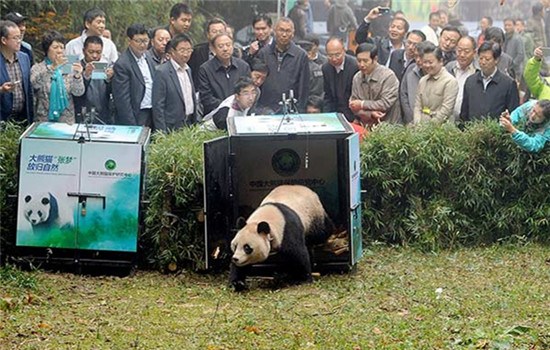
Hua Yan, a female giant panda, is released into the wild in Shimian county, Sichuan province, on Thursday. (Photo by He Haiyang/For China Daily)
There have been seven bears set free since 2006, two of which died
Two captive female pandas from the China Conservation and Research Center for the Giant Panda in Wenchuan county, Sichuan province, were released into the Liziping Nature Reserve in the province's Shimian county on Thursday morning.
Hua Yan, 3, and Zhang Meng, 2, started receiving training for survival when they were about 1 year old.
"The two cubs have distinguished themselves in training and can recognize their natural enemies, establish their own territory, and look for food and a source of water," said Huang Yan, chief engineer of the center.
Thursday marked the sixth time pandas from the center had been released into the wild with the intention of increasing the wild panda population.
"The purpose of breeding captive pandas is to conduct research and return them to the wild to enlarge the wild panda population and prevent their extinction," center chief Zhang Hemin said.
The center was set up in 1980 under an agreement between the World Wide Fund for Nature, formerly the World Wildlife Fund, and the Chinese government.
Jia Jia, the longest-living panda in captivity, who was euthanized at the age of 38 on Sunday at Ocean Park in Hong Kong, was captured as a cub in 1980 in the Tangjiahe Nature Reserve in Sichuan.
It used to be difficult for captive pandas to become eroused and mate, and for their cubs to survive. As researchers in the center have worked to solve the three problems, the center has built up the world's largest captive panda population. It is home to 234 captive pandas, accounting for nearly 60 percent of the world's captive panda population.
As the center has enough captive pandas to prevent the species' extinction, it has released captive pandas instead of catching them for research purposes, Zhang said.
The first panda released into the wild was Xiang Xiang, who was born in 2001. The male panda was released in 2006. In 2007, his body was found in the woods, with broken ribs and injuries to his ears and back. Researchers suspected he had taken refuge in a tree after fighting with wild pandas, but had fallen.
His death forced handlers to revise their approach to training pandas to survive in the wild. They started training female pandas to be released into the wild.
"Female pandas might be more likely to integrate into the wild panda population. Releasing a captive panda into the wild cannot be hailed as a success until the bear has been accepted by a wild panda and has one or more cubs with a wild panda," Zhang said.
Since 2006, the center has released seven panda cubs into the wild, five of them female.
In 2013, Zhang Xiang, a 2-year-old female, was released into Liziping.
Earlier this year, researchers wanted to capture her for a checkup. With information from a GPS tag on her neck, they managed to find her after trekking the mountains for nearly three hours.
But she ran away at the sight of humans. Although no physical checkup was conducted, she is believed to be in good health, said Zhang Guiquan, a senior researcher in the center.


















































